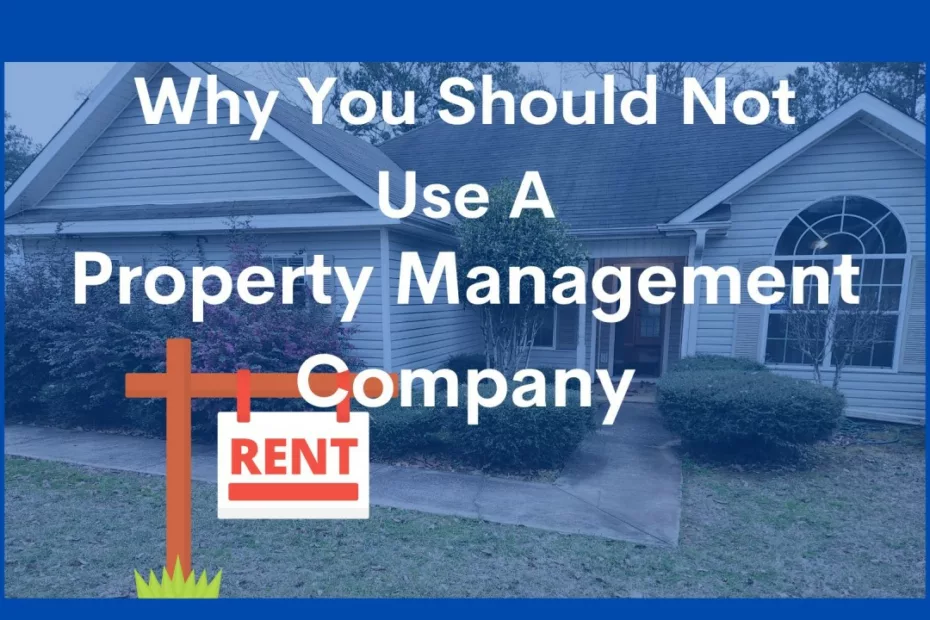I have been building a portfolio of rental properties for the last 15 years and have nearly 70 properties. I have managed the properties myself, used a professional property management company for my rentals, and now own a property management company. I understand this business from both sides, so let me show you whether hiring a property management company for your rentals is good.
You should not hire a property management company to manage your rental houses. The cost is rarely worth the service provided. The only exception is when you have a small portfolio and don’t live near those properties. Even then, there are better ways to manage your rental properties.
Using a property management company can be alluring. Granted, there are some advantages, but these are trivial, and there are better ways to accomplish those benefits. I will explain the drawback of using a management company, propose a better solution, and even explain how you might want to use a property management company more effectively.
How Do Property Management Companies Work?

The first thing you need to know about using a property management company for your rentals is how it works. Property management firms will find good tenants for your house, which includes screening potential tenants, running background checks, and signing the lease agreement. Once the tenant is in place, they will handle all interactions with the tenant, including collecting rent and maintenance requests. In addition, a good property management company will handle an eviction should the need arise.
What are the property management fees?
Typically, the management company charges the equivalent of one month’s rent upon selecting a tenant and 10% of the monthly rent going forward. In addition, the management company will bill you for additional fees such as repairs, tenant calls, and legal fees. The fees charged by a property management company are negotiable. At one point, I had a property management company agree to charge only 8% of the monthly rent to manage over 25 properties.
Handling Repairs and Maintenance
When repairs are needed, the property management company will handle all aspects of this maintenance. They will find a suitable contractor or use in-house staff, and they will often oversee the quality of work. You will be billed for this work.
Using a property management company to handle repairs is not a cost-efficient way to manage your rental houses. The management company has no incentive to keep the costs low because the landlord pays the bill. It is much easier for them to have a stable of workers or send out the first qualified person, regardless of cost. An essential aspect of managing rental properties is managing the operating expenses, and once you engage a property management company, you have lost control of this crucial task.
If you object to this way of handling repairs, the property management company will call you when repairs are needed and let you arrange the work. At first, this may sound reasonable, but then you have the hassle of finding workers, soliciting bids, and ensuring the quality of the work. This will allow you to control operating expenses better, but what service are you getting for your 10% monthly fee? None. Do not use a property management company for your investment property.
Collecting Rent

The property management company signs a lease with a tenant, and this lease will list the company as the landlord, not you. They will collect rent, take their fee, and pay the remainder to you. If the tenant doesn’t pay, the management company will send collection letters and attempt to collect payment for you. If the tenant must be evicted, the management company will usually handle the court action and removal.
This collection and eviction service may be worth the 10% fee, but often you don’t need these services. In that case, you get very little for the 10% fee. With a $1,000 per month rental, you are paying the property management company $1,200 a year, and they are acting as a check forwarding service.
Suppose the tenant stays three years, stops paying, and must be evicted. In that case, you have spent $3,600 in management fees for an eviction. You can hire an attorney to perform the eviction for a fraction of that cost, assuming the tenancy ends in eviction.
A Better Solution
To build an extensive rental portfolio, you should start by managing your own properties. This approach will allow you to learn all aspects of property management, including finding tenants, addressing repairs, and handling evictions. This knowledge is invaluable as your number of investment properties increases. If you ever decide to hire a property management company, the experience you get from doing it yourself will better equip you to evaluate their service level.
As your portfolio grows, you can hire an employee to take care of management details and pay them a percentage of the rent. An employee will often charge less and perform a wider variety of services. You can instruct the employee on picking a tenant and performing all the operations of a property management company. On top of that, they will handle details of your business that a property management company wouldn’t.
How to Use a Management Company Effectively
A well-run property management company is skilled at finding and evaluating tenants, which is well worth the cost of one month’s rent, and maybe a little more. As explained above, such a company’s drawbacks are how it handles repairs and what you get when everything is going smoothly.
Real estate investors could use the property management company to find the tenant and sign them to their lease for a one-time fee. After that, the rental property owner should manage the property and save the 10% monthly fee. If an eviction is necessary, the investor handles it or hires an attorney.
When a Management Company Might Help

In some cases, when you have a minimal number of properties and don’t live near them, it may be a good idea to use a property management company. I still prefer hiring an employee in the area on a part-time basis. That being said, using a property management company is not a disaster under this scenario. Remember that, in most cases, hiring an employee would be more cost-effective if you have more than 15 properties in that area.
Another case for a property management company is when your property ownership will be limited to a short time. For example, suppose you have inherited a property you plan to sell. In that case, it may be a good idea to use a property management company to handle everything until you divest yourself of the house. If you do this, be sure your agreement with the management company allows a new owner to cancel the deal.
Why do so many experts recommend using a property management company?

When it comes to the recommendations made by gurus advocating the use of property management companies, it’s essential to delve into their underlying motivations. Although these gurus position themselves as experts, they often have no experience in the field. Questioning their suggestions is crucial, as they may be driven by salesmanship rather than providing unbiased advice.
Gurus often want to present the rental business as effortless and hassle-free, appealing to individuals who seek quick and easy solutions. By recommending property management companies, they aim to alleviate concerns associated with the perceived difficulties of managing rental properties. This allows them to promote their expensive seminars and training programs on the desire for an easy pathway to success in real estate investment.
So-called experts may argue that individuals with limited time availability or a full-time job should outsource property management to save time. They propose that relying on a property management company frees up time for other pursuits, making real estate investment appear more accessible to busy individuals.
This is to overcome objects and sell their material. This recommendation overlooks the fact that successful real estate investors often manage their properties themselves or hire dedicated employees to handle day-to-day operations. True experts know the best way to manage rental units is to do it yourself.
How to Effectively Manage Your Rental Property

A real estate investor does not need the help of a property management company to manage their rentals. With only a few rentals, it’s a simple job to manage them yourself. As more rentals are accumulated, hiring an employee to help with the day-to-day work is better.
The Importance of Tenant Screening
Tenant screening is the number one factor for reducing turnover and avoiding damage to rental properties. Conducting thorough tenant screening processes, including background checks, credit reports, and rental applications, is crucial to ensure that you find good tenants who are likely to pay rent on time, maintain the property, and abide by the terms of the lease agreement. By implementing diligent tenant screening practices, property owners can minimize the risks associated with bad tenants, late payments, and potential legal issues, ultimately promoting a more secure and successful rental experience.
Setting the Rental rate
Setting the rental rate is a crucial aspect of effective property management. It involves determining the appropriate amount to charge for rent based on factors such as market conditions, property location, size, amenities, and comparable rental rates in the area.
A landlord cannot set the rent to an arbitrary amount. They must set the rent at or below the market rate to attract acceptable tenants. Below are several reasons why it’s essential to select the right rental rate:
- Setting the correct rent rate ensures property owners generate sufficient rental income to cover mortgage payments, maintenance fees, property taxes, and insurance.
- A competitive rental rate helps attract prospective tenants by offering competitive pricing that aligns with similar properties in the market.
- Setting an appropriate rental rate contributes to maintaining a low vacancy rate, ensuring consistent cash flow, and maximizing the property’s potential as a source of passive income.
For details on how to set the correct rent, read my tutorial on finding the market rent.
Handling Maintenance Requests
Handling maintenance requests promptly is a vital aspect of property management. It plays a significant role in tenant satisfaction, reducing turnover, and maintaining the overall condition of your rental property.
- Responding to maintenance requests promptly is crucial for tenant satisfaction and retention. When tenants experience maintenance issues, addressing them promptly demonstrates your commitment to providing a safe and comfortable living environment. By promptly resolving maintenance problems, you enhance tenant satisfaction, build positive landlord-tenant relationships, and increase the likelihood of lease renewals.
- Don’t be a slumlord. Ignoring maintenance requests can have detrimental effects on your rental property. Neglecting maintenance issues can lead to further property damage, potentially costing more in repairs in the long run. Additionally, neglectful landlords have more vacant units because their tenants leave. The work must be completed to attract the next tenant anyway, so nothing is saved.
- Always engage professional contractors for repairs rather than attempting to handle all maintenance tasks yourself. Taking the tenant’s call and promptly contacting a qualified contractor ensures that experienced professionals address maintenance issues. This “take a phone call” – “make a phone call” approach reduces the hassle, provides more free time, and elevates the need for a property management company to help with rentals.
Conclusion
New investors embarking on their journey in real estate should strongly consider managing their own rental properties, starting from their very first property. While the allure of a property management company handling the rentals may seem enticing, the costs, limited control, and potential drawbacks outweigh the benefits, especially for those just starting out.
By managing their own rental property, investors gain firsthand experience and knowledge in all aspects of property management, including tenant screening, repairs, and legal compliance with local laws and fair housing regulations. This hands-on approach allows for greater control, a deeper understanding of the business, and the ability to make informed decisions regarding the right property manager if and when the time comes.
In general, hiring a property management company is not worthwhile. The costs are high, the level of service is low, and there are better options. The get-rich-quick gurus recommended this to overcome the objection about the hassles involved with rental houses. These gurus want the rental business to seem effortless, making it easier to sell their expensive seminars.
Investing in rental real estate is far from effortless, and in most cases, a property management company will drain your profit and hinder your ability to succeed. You should not use a property management company to manage your rental houses except for very few exceptional circumstances.




